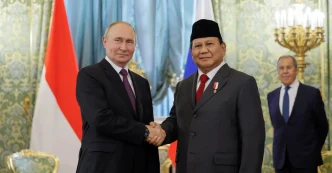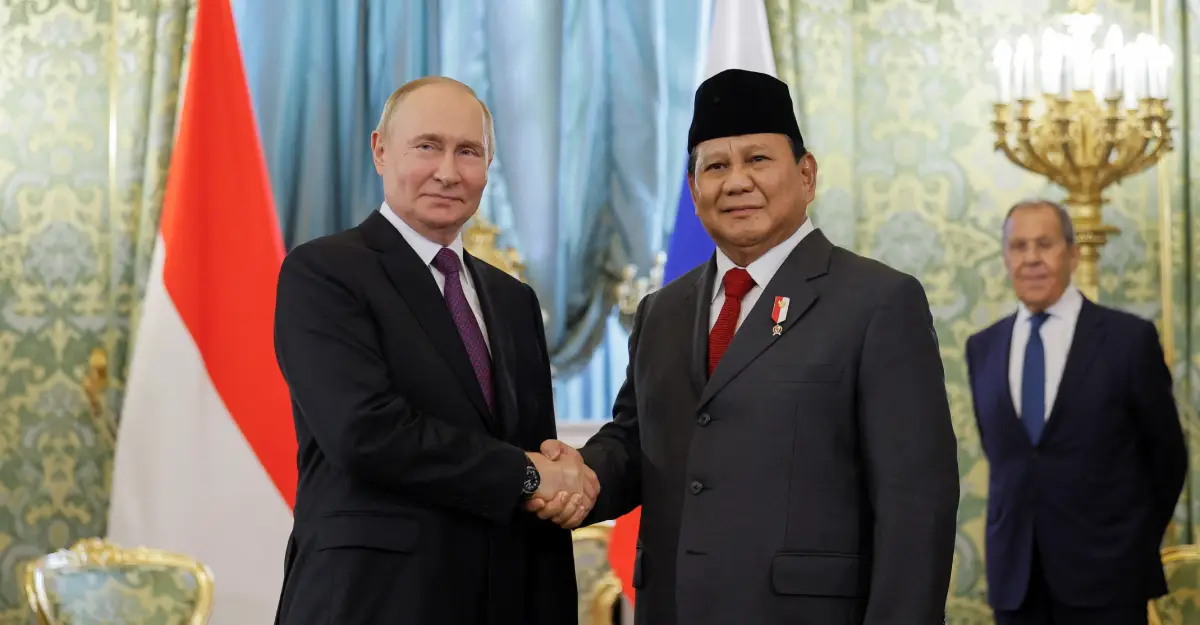Indonesia’s President Prabowo Subianto has signaled a bold, independent stance in global affairs, cautioning against the perils of aligning too closely with dominant powers. Speaking at the Eastern Economic Forum in Vladivostok, Russia, on May 6, 2025, Prabowo emphasized the importance of sovereignty and self-reliance for nations of the Global South, a message that resonates deeply with Indonesia’s long-standing non-aligned foreign policy.
His remarks, delivered amidst a gathering of leaders and business figures from across Asia and beyond, underscore a growing assertiveness in Jakarta’s approach to international relations. As geopolitical tensions simmer between major powers, Prabowo’s speech offers a glimpse into how Indonesia—the world’s fourth most populous nation—intends to navigate an increasingly polarized world.
A Call for Independence
Addressing the forum, Prabowo warned that following the most powerful nations could be a “mistake” for countries like Indonesia. “We must stand on our own feet, decide our own destiny, and not be swayed by those who hold power today” he declared, according to reports from Asian News Network. His words reflect a deep-seated wariness of over-reliance on any single global power, a stance rooted in Indonesia’s historical commitment to non-alignment since the 1955 Bandung Conference.
Prabowo’s comments come at a time when Indonesia faces mounting pressure to align with either Western or Eastern blocs amid global rivalries. While he did not name specific countries, the context of his speech in Russia—a nation often at odds with Western powers—suggests a nuanced critique of both sides. Analysts interpret this as a deliberate effort to assert Indonesia’s autonomy in a multipolar world.
Global South Solidarity
A key theme of Prabowo’s address was the need for unity among developing nations. He urged countries of the Global South to collaborate on economic and political fronts, arguing that collective strength could counterbalance the influence of more powerful states. “Our future lies in cooperation, not in becoming pawns in someone else’s game” he said, highlighting the shared challenges of poverty, inequality, and climate change that bind these nations together.
This call for solidarity aligns with Indonesia’s recent efforts to amplify the voice of the Global South on the international stage. Under Prabowo’s leadership, Jakarta has sought to position itself as a mediator in global conflicts, from offering to host peace talks to advocating for equitable vaccine distribution during the COVID-19 pandemic. His presence at the Vladivostok forum, hosted by a nation often viewed skeptically by the West, further illustrates Indonesia’s willingness to engage with diverse partners.
Navigating Geopolitical Tensions
Prabowo’s trip to Russia occurs against a backdrop of heightened geopolitical friction. The Eastern Economic Forum, an annual event aimed at fostering ties between Russia and Asia-Pacific nations, has taken on added significance as Moscow seeks to deepen economic partnerships in the region amid Western sanctions. For Indonesia, attending such a forum risks misinterpretation as an endorsement of Russia’s policies, particularly regarding conflicts like Ukraine.
Yet, Prabowo appears to be walking a tightrope with finesse. His administration has clarified that participation in the forum does not signal alignment with any side but rather reflects a pragmatic approach to securing economic opportunities. Indonesia, with its vast natural resources and strategic maritime position, remains a critical player in global trade networks. Strengthening ties with Russia, particularly in areas like energy and agriculture, could yield tangible benefits for Jakarta—provided it does not alienate other key partners like the United States and the European Union.
Foreign policy experts note that Prabowo’s rhetoric mirrors Indonesia’s traditional “free and active” doctrine, which prioritizes independence while engaging with all nations. “Prabowo is signaling that Indonesia will not be boxed into any camp” said Dr. Lina Susanti, a Southeast Asia analyst based in Jakarta. “This is a continuation of a long-standing policy, but with a more assertive tone that reflects today’s polarized environment.”
Domestic Implications of a Global Stance
At home, Prabowo’s international posturing carries significant domestic weight. Elected in 2024 on a platform of nationalism and economic development, he faces the dual challenge of bolstering Indonesia’s global standing while addressing pressing internal issues. With over 270 million citizens spread across thousands of islands, the country grapples with disparities in wealth, infrastructure, and access to education—challenges that require both domestic reform and international cooperation.
His emphasis on self-reliance at the Russia forum may resonate with Indonesians who view foreign influence with skepticism. Historical grievances, from colonial rule to economic interventions by global institutions, have fostered a strong sense of national pride. Prabowo, a former military general with a controversial past tied to human rights allegations during the Suharto era, has sought to reframe his image as a defender of Indonesian sovereignty. His speech in Vladivostok serves as both a foreign policy statement and a message to his domestic base.
However, critics caution that lofty rhetoric must be matched by concrete action. While Prabowo’s vision of an independent Indonesia is compelling, translating it into policy—whether through trade deals, defense partnerships, or climate initiatives—will test his administration’s capacity. “Words are one thing, but navigating the practicalities of non-alignment in a world of economic interdependence is another” noted a Jakarta-based political commentator who requested anonymity due to the sensitivity of the topic.
Economic Dimensions of Independence
Prabowo’s appearance at the Eastern Economic Forum also highlights the economic dimensions of his foreign policy. Indonesia’s economy, one of the largest in Southeast Asia, is heavily reliant on exports of commodities like palm oil, coal, and nickel. Diversifying trade partners is a priority for Jakarta, especially as global supply chains face disruptions from geopolitical conflicts and climate-related crises.
Russia, despite its strained relations with much of the West, remains a significant market for energy and agricultural products. Discussions at the forum reportedly included potential collaborations in these sectors, though no formal agreements were announced during Prabowo’s visit. Any deals would likely be scrutinized for their economic benefits as well as their political implications, given the international spotlight on Russia.
Moreover, Prabowo’s government is keen to attract investment for infrastructure projects under Indonesia’s ambitious capital relocation to Nusantara in East Kalimantan. Estimated to cost 466 trillion Indonesian Rupiah (US$29 billion), the project symbolizes the country’s aspirations for modernization but has faced funding shortfalls and logistical hurdles. Engaging with diverse partners, including Russia, could provide the necessary capital—though at the risk of domestic backlash if perceived as compromising national interests.
Looking Ahead in a Multipolar World
As Prabowo concluded his address in Vladivostok, he reiterated a vision of a world where smaller nations are not mere spectators but active participants in shaping global outcomes. “The future belongs to those who dare to stand for themselves” he said, a statement that encapsulates both his personal political journey and Indonesia’s evolving role on the world stage.
Yet, the path to true independence remains fraught with challenges. Balancing relations with major powers, securing economic stability, and maintaining domestic support will require deft diplomacy and strategic foresight. For now, Prabowo’s words at the Eastern Economic Forum serve as a declaration of intent—a signal that Indonesia, under his leadership, aims to carve out its own space in a complex and often contentious global landscape.
As the world watches Indonesia’s next moves, questions linger about how far this commitment to sovereignty will take the nation. Will Prabowo’s vision translate into meaningful partnerships and policies, or will it remain a rhetorical flourish? Only time will reveal the full impact of his stance, but one thing is clear: Indonesia is determined to be a voice, not an echo, in the chorus of global affairs.















